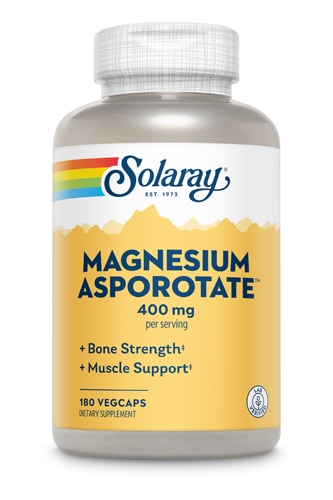Call it the Mighty Mineral. Playing a leading role in over 300 biochemical functions, magnesium may be prolific in some of the most healthful foods out there—almonds, spinach and avocados, to name just a few—but studies out of the National Institutes of Health report that most U.S. residents aren’t getting enough of the good stuff. What’s more, certain situations—from alcoholism and intestinal problems to a less-than-stellar diet—can cause your body to lose magnesium quicker than you can replenish it.
Consider it a cause for concern. Magnesium works with a vital energy-storage molecule called ATP (adenosine triphosphate) to provide your body with energy—indeed, ATP can’t operate without magnesium. And as for those 300 biochemical functions? They, too, are crucial, from building and maintaining healthy bones to transporting calcium and potassium to cell membranes in a process that’s critical to nerve function, normal heart rhythm and muscle contraction. What’s more, magnesium naturally supports good digestion and cognitive health. In other words, ensuring you’re getting enough of “the mighty mineral” should soar to the top of your health to-do list. (According to the NIH, males between 31 and 50 should get 420 mg per day, women in the same age group should receive 360 mg daily, and nursing mothers should aim for 320 mg.)
Besides piling your plate with magnesium-rich foods—cashews, black beans, edamame, and oatmeal are also savvy choices—you may elect to start taking magnesium supplements. But from magnesium citrate to magnesium taurate, it can be challenging to make a decision that will be most advantageous to you and your situation. In addition to consulting with your primary care physician or naturopath, here’s a brief breakdown of 7 of the different types of magnesium to aid you in your efforts:
1. Magnesium chloride
Perhaps the most popular magnesium supplement on the market, magnesium chloride—which is extracted from brine or ocean water, and is argued to be the most effective form of dietary supplementation—organically encourages sleep, digestion, bone health and a sense of calm (both mental and physical). That said, supplementing with this form of magnesium may cause diarrhea.
2. Magnesium sulfate
Sound familiar? If you, too, are the sort of person to read the fine print on everything from cereal boxes to bath products, chances are magnesium sulfate will remind you of bath time. Otherwise known as Epsom salts, magnesium sulfate has long been a boon for athletes—or, really, anyone with sore muscles; it’s also widely known for its laxative effects.†
3. Magnesium citrate
Citrate might sound familiar too—consider it an erudite way of saying that it’s derived from citric acid (in this case, magnesium salt is obtained from the citrus acid). With excellent bioavailability—that is, the efficacy with which a substance is absorbed and used by the body—it’s no wonder magnesium citrate one of the most highly recommended magnesium supplements by health professionals. Often used to naturally support digestion—specifically, to alleviate constipation and acid indigestion—it’s also, bonus points, easy on the wallet. However, it may lead to dehydration (and the imbalance of minerals that arrives with this), in that it pulls water into the intestines.
4. Magnesium oxide
With lower levels of bioavailability than its other iterations—that is, it scores only 4 percent, while magnesium citrate has a bioavailability of 90 percent—magnesium oxide is found in Milk of Magnesia and similar products, and, as such, organically encourages improved digestion.†
5. Magnesium glycinate
Feeling stressed? This may be the form for you. While magnesium in its many different forms has been shown to naturally support muscle relaxation, magnesium glycinate might just take the cake (to note: the amino acid glycine is known for the calming impact it can have on the mind and body).† Additionally, it has optimum bioavailability and, unlike some of its kin, isn’t known for its laxative properties.
6. Magnesium orotate
Those searching for supplements that may organically encourage heart health might give this type a try. With its inclusion of orotic acid (formerly known as B13), it’s also a favorite among athletes, given that it may naturally support the repair of tissues, as well as enhanced stamina and performance.† This is partly reflected in its price tag: Magnesium orotate often comes with a heftier fee than, say, magnesium oxide or citrate.
7. Magnesium L-threonate
Dubbed a “breakthrough” supplement by some, magnesium L-threonate possesses not only good bioavailability but also the potential to improve cognitive functions, with the National Institutes of Health reporting that memory deficits—particularly short term memory loss caused by chronic pain—may be just one of the potential benefits of this form of magnesium. This is encouraging news, especially when considered with other research, including a 17-year study that followed more than 1,000 Japanese people over the age of 60; those who consumed more than 200 mg per day were 37% less likely to develop any type of dementia. In the interim, magnesium L-threonate may sharpen your wit and ability to remember an acquaintance’s name—just as it may remind you to eat your legumes: A mere cup of black beans will give you 120 mg of the magical mineral, possibly leaving you feeling just as mighty.
†These statements have not been approved by the Food and Drug Administration. These products are not intended to diagnose, treat, cure or prevent disease.




